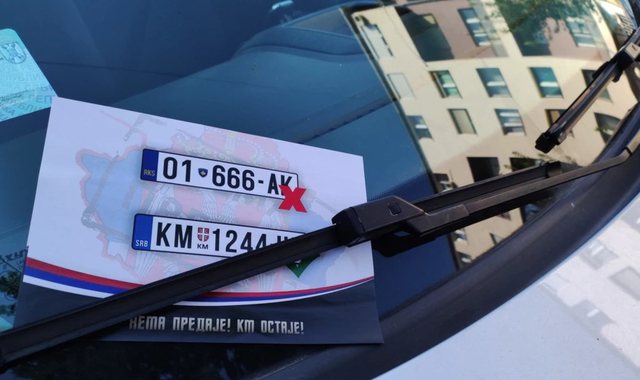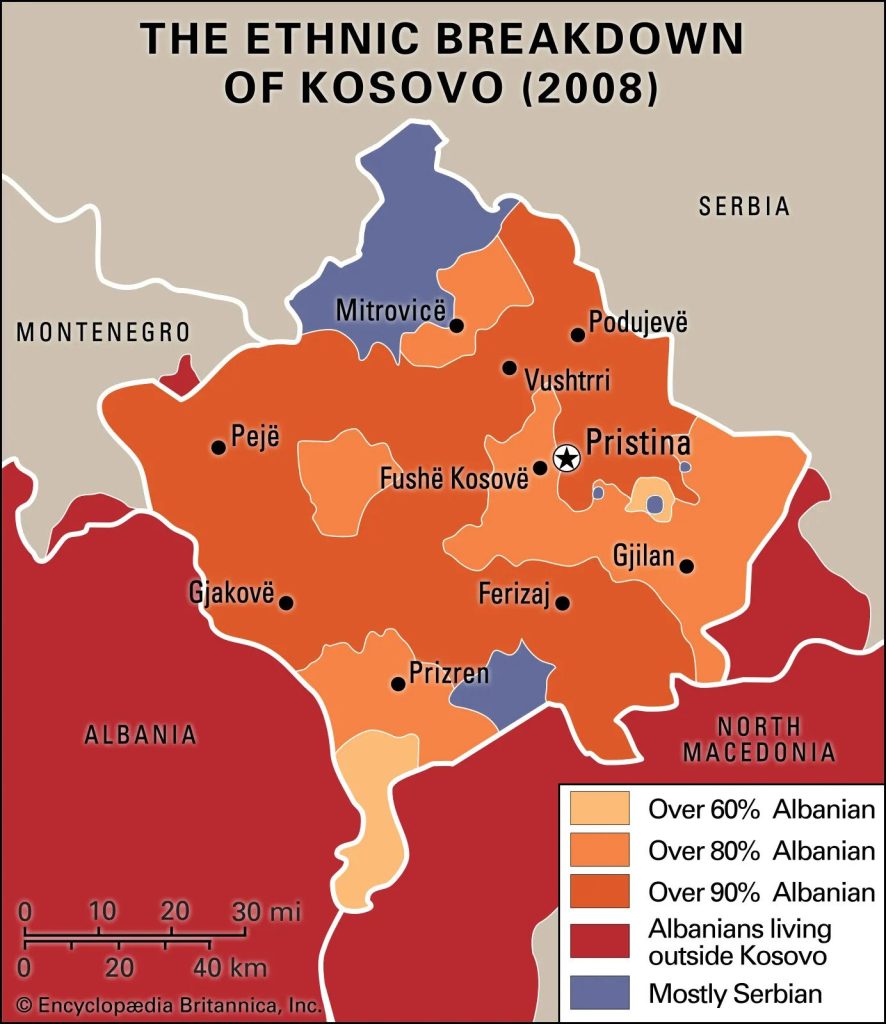In the past months, several Kosovar Serbs have had their cars and properties burned after accepting to replace licence plates issued by Serbia with those issued by the Kosovar government, as requested by Pristina. According to police reports, the cases of arson against vehicles that have switched Serbian registration plates have been at least eight in the past two months. The attacks were registered primarily in the northern part of Kosovo in the Mitrovica District (towns of North Kosovska Mitrovica, Zvečan, Leposavić, and Zubin Potok), where the Serbian ethnic group represents the relative majority, and were aimed at dissuading Serbs through fearful means to accept the introduction of license plates issued by the Kosovar central government. Starting from last June, the Kosovar government announced the intention to replace the license plates that presented the country identifier “SRB” (“Serbia”) and the Serbian cross shield with those with the country identifier “RKS” (“Republic of Kosovo”) and the Kosovar coat of arms; specifically, the disposition considered illegal the Serbian-issued licence plates that presented the area codes PR, KM, PZ, GL, UR, PE, and DA. In the following months, this decision led to mass protests and eventually to the resignation of Kosovar Serb MPs, councillors, judicial officials, and police officers. As for the perpetrators of the vandalic acts, the Kosovar government pointed the finger not at local Serbs but rather at some organized groups closely connected to Belgrade. Thus, currently in Kosovo, apart from work or leisure, cars are as also used as tools to trigger geopolitical tensions.

After the protests’ outbreak, under European and international pressure, the Kosovar government opted to establish a phased implementation of the license plate change, starting from November 21, 2022 until April 21, 2023. During the first phase (until November 21), drivers continuing to use Serbian plates will be reprimanded; during the second phase (November 21 – January 21) they will be fined; during the third phase (January 21 – April 21) they will be forced to attach probationary plates to their cars; lastly, the final phase (from April 21) the only legitimate license plates in Kosovo will be considered the ones issued by Pristina. However, Serbia clearly stated that it did not believe an agreement with Kosovo over the issue was possible and that these projects would not be easily implemented. Even last year, an attempt to implement Kosovar car licensing was met with protests by Kosovar Serbs backed by Belgrade. Moreover, Kosovar Serb leaders, including members of the political party “Serb List” (Srpska Lista), have warned that they would implement a blockade of the roads in the Mitrovica District if the measure will be imposed.
But why is the Kosovar situation getting so tense? A quick glance at the history of Kosovo since the breakup of Yugoslavia can help answering this question. In February 1998, in the broader context of the ethno-nationalist civil conflicts that followed Yugoslav secessions, the war for the future status of Kosovo broke out. During the Yugoslav epoch, Kosovo embodied, along with Vojvodina, an autonomous entity of Serbia known as the Autonomous Province of Kosovo and Metohija (Kosmet or KiM). Due to ethnic discriminations perpetrated by the Yugoslav central government against the local Albanian group, the separatist militia of the Kosovo liberation army (KLA, or, in Albanian, Ushtria Çlirimtare e Kosovës, UÇK) began an overt struggle against the troops of what was then left after the 1991-1995 wars of the Federal Republic of Yugoslavia. Made up of ethnic Albanian separatists, the chief goal of the KLA was to implement the independence of Kosovo from Belgrade. In March 1999, after the failure of the Rambouillet agreement, while major war crimes were intensifying on both sides, NATO intervened with a series of air attacks against the Yugoslav political and military apparatus of Slobodan Milošević. The conflict ended with the Kumanovo agreement (June 1999) with the withdrawal of Yugoslav federal troops from Kosovo and the establishment the United Nation interim administration Mission in Kosovo (UNMIK), an international protectorate under the aegis of the United Nations. Meanwhile, the NATO-led Kosovo Force (KFOR) peacekeeping mission began its operations to safeguard regional peace and security. In February 2008, Kosovo proclaimed unilaterally its independence from Serbia, finding support and recognition among the United States and most European governments including Great Britain, Germany, France, and Italy – but not, remarkably, Spain and Greece. On the contrary, Russia expressed its official opposition, believing that this self-proclamation represented a violation of the international law principle of territorial integrity. Since then, the status of Kosovo has been a political and juridical controversial issue, dividing the positions of the international community and increasing the risks of new geopolitical tensions in the Balkan region, the so-called Powder Keg of Europe.

Today, some 100.000 ethnic Serbs live in Kosovo (roughly 5% of the total population), mostly in the northern part of the country, and many do not recognize the independence and authority of the government in Pristina. At the same time, the Serbian government in Belgrade, not recognizing Kosovar independence, continues to issue its own license plate registrations, since it views the Serbian-Kosovar border as a mere internal and administrative one. Also, in the frame of the ongoing license plate crisis, Serbia officially stated that it «stands by our brave and proud people in Kosovo». This is not surprising considering that ever since the war and the withdrawal of Serbian forces from Kosovo, Belgrade has continued to carry out a parallel state system, issuing papers, licence plates and other documents for Kosovar Serbs. Given the mutually irreconcilable perspectives of Pristina and Belgrade, the current scenario could lead to potentially dangerous avenues that could once again put at stake peace and stability in the Balkans.
The license plates’ crisis entails international repercussions. At the EU level, earlier this month the High Representative of the Union for foreign affairs and security policy Josep Borrell labelled the ongoing Kosovar license plates’ issue as the most worrisome crisis between Kosovo and Serbia in the last decade. In the last years, the EU has been an active mediator between Pristina and Belgrade to normalize Kosovar-Serbian relations. For instance, Brussels has been an active negotiator for making Kosovo and Serbia sign a deal to allow free movement between the two countries. In 2011, the EU encouraged the implementation of a Belgrade-Pristina Dialogue aimed at normalizing relations among Western Balkan neighbours. In this sense, Borrell affirmed that the withdrawal of Kosovar Serbs from Kosovar political, military, and judicial institutions has the potential to exacerbate the situation and escalate tensions. Thus, the EU’s official position contemplates, at least, the need to slow down the process of licence plate exchange. Even NATO, which continues to perform its peacekeeping operations in the frame of KFOR with little less than 4000 troops operating in the region, invited Pristina and Belgrade to prevent escalations. The EU and NATO are fully aware that an escalation of the crisis could have repercussions in neighbouring countries, potentially igniting a dangerous domino effect. Specifically, a region that could be directly influenced by the developments of this crisis is Republika Srpska, the Serbian political entity within Bosnia-Herzegovina, where fears of inter-ethnic violence are always a reality. The political leadership of Banja Luka, the de facto capital of Republika Srpska, has been overtly advocating for Bosnian Serbian entity to separate from the rest of the country – that is, the Croatian-Bosniak Federation of Bosnia and Herzegovina –, receiving an enthusiastic Russian support. In Bosnia-Herzegovina, the order imposed by the Dayton Agreement has never been truly accepted by the different Bosniak, Croat and Serbian components of the population. If the question of the ethnic Kosovar Serbs becomes once again central in the political debate of former Yugoslavia, it is very likely that the same may occur with the Bosnian Serbs, making the political situation in Bosnia even more precarious. At the same time, though being fought some two thousand kilometres away, the Russian-Ukrainian war can play an important role in further destabilizing the Western Balkans. Traditionally, Russia has always been seen as the defender and supporter of the Serbs, mostly because of the historical and religious liaisons built around the common belonging to the Eastern Orthodox church. Serbia and ethnic Serbs still view Russia as their main reference vis-à-vis major global powers. Thus, the ongoing Ukrainian conflict could influence geopolitical dynamics in the Balkans by inflaming new tensions between pro-Russian and pro-Western Balkan nations and allowing the resurface of all unsolved issues and unsettled controversies, from Transnistria to North Macedonia.

In conclusion, the issue of Kosovar licence plates could represent that small spark that could inflame yet again the Powder Keg of Europe. History teaches us that seemingly circumscribed events that take place in the Balkans – like the suppression of Bulgarian rebels by Ottoman forces in 1876 labelled as “Bulgarian atrocities” or the assassination of the Archduke Franz Ferdinand of Austria by the Bosnian Serb Gavrilo princip in 1914 – resulted in the outbreak of major conflicts – respectively, the Russo-Turkish war and World war one. Thus, the international actors that currently enjoy influence in the region must assure through their persuasion and the tools of diplomacy and political negotiations that a minor event like a dispute over the legitimate issuer of a licence plate may not degenerate into a new, unwanted international crisis.
Paolo Pizzolo
